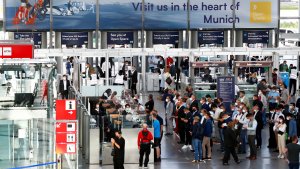What Is Business Travel For?
Even passionate flyers need to take a fresh look at trips abroad.

I love flying. As a CEO of a global ecommerce platform head-quartered in Germany, I’ve averaged 40 to 50 flights a year for most of the last 15 years, including flying transatlantic five or six times a year.
Often this meant different cities every week, or even every day; seven to ten countries a year. A higher frequent flyer status was my dream and I loved it. I have even flown Berlin to Los Angeles for a single day of meetings.
But truly we all know this is not sustainable, even when paying off my flights with carbon credits.
At the end of 2019 my new year’s resolution was to fly less. So I started by deciding on no trips until the end of March 2020. With the onset of COVID, this rapidly turned into no flights until August, then ‘til the end of the year.
I managed two minor return flights from Berlin to Heathrow to see family. Two short returns where I would usually have taken dozens.
So why would I choose to fly so much? And what has been the impact of not flying? The main reason for flying is to:
- Get a global perspective
- Support and help local teams
- Build relationships with those teams and key customers.
Actually, is this about support and perspective, or is it about a lack of trust? Does senior management travel because we don’t really believe it until we see it ourselves?
In this year of non-travel we have been forced to consider that trust and relationships can be built in other ways.
- Creating empowerment. Did I really not trust or believe my international teams? When an American tells a CEO in Germany that something is happening, why do I need to see it to believe it? Do I not trust that my local teams can solve the same problem we had in Germany or even a new one we have never seen? We have to learn to empower local teams more. They can sort it in their own way.
- Often international work travel is justified by learning how things are done. But constructive feedback and retrospective techniques can formalise the learnings faster than going through the airport. It also helps to share the information around the company; there’s less danger of the one flying person forgetting it on the way home.
- Unity/Feel Good Management. Our Feel Good Manager has been busy working out ways for us to stay connected and support our teams during the pandemic. To try and create a global, online culture, we have introduced new ideas:
- A virtual coffee break room is open all day for people to drop by.
- A shared messaging channel has become a space to swap recipe ideas and lockdown treats.
- We have active breaks like meditation or a kid’s disco that our staff and their families can join.
- Company laptops are available to parents who are home schooling their children.
- Good relationships with customers and teams happen when you listen. When you truly listen, rather than waiting to jump in with your solution, you learn about more than just their problems, you demonstrate that you are learning and considering their perspective. Which of course, helps to build trust and unity.
All this can seem easier said than done. We have all experienced projects with people in multiple cities where one team is getting frustrated.
We’ve all sat through conference calls with underlying agendas, endless video conferences with everyone stating different, apparently unresolvable, points that can’t be addressed until we get everyone together.
No amount of listening, empowerment, learning and feel good management is going to fix this.
So are we back to flying and visiting in person? I think there’s another way to replace personal visits; the old-fashioned phone call. Very 20th century. Getting on the phone is the quickest way to make a connection.
It allows for a straightforward conversation; you can pick up on any other issues that may be lurking or just take the opportunity to ask about non-work issues.
It’s informal, fast, and you don’t have to stare at your screen while you do it. Somehow not having to look at each other makes it easier to think too.
Flying will eventually come back, but hopefully for the planet, not in the same way as before. The so-called new normal will have to mean limited international flights. But if I can adjust, then so can anyone.
And when we do travel again, we need to take it a bit slower; take in the scenery, make the most of it. Instead of visiting each of my factories 3 to 5 times a year, it may be a bi-annual visit but spend a couple of days to really listen to the locals.
We’re planning for a return to visiting our colleagues eventually, but in a more thoughtful and enjoyable way. We want our people to travel less, but more effectively. Business travel needs to be a proper perk, with some fun thrown in.
I love flying, but it’s time to make business travel better when we’re allowed to get out there again.
Phil is the CEO of Spread Group, a €130m global ecommerce platform.
Thanks for signing up to Minutehack alerts.
Brilliant editorials heading your way soon.
Okay, Thanks!


